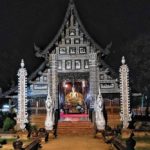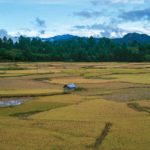Vercelli: Where Nothing Happens
In Vercelli, a small town in Italy, it is not time but idleness that heals
 Sumana Roy
Sumana Roy
 Sumana Roy
Sumana Roy
 |
28 Jun, 2019
|
28 Jun, 2019
/wp-content/uploads/2019/07/Wherenothinghappens1.jpg)
Every space offers its gifts in the first few minutes: the chair gives rest to the spine; soil glue and gravity to roots for letting the plant stand erect; a church, with its high ceiling, a mist of quiet; a playground freedom from walking on straight lines; a bakery the sweet aroma of nourishment. When I arrive in Vercelli on a late spring afternoon, the sun accompanying me, the streets are empty. But the sun stops when I enter the narrow alley that will take me to Il Cortile, where I shall be spending a month—it refuses to go any further. Overlooking the window of my bedroom is a rectangular garden—I have a sense of grass wedged between stones though I can’t really see them, and leaning against the walls are bamboo trellis that offer support to creepers, like guardians offering a finger to their little child to cross the road or a puddle. Holding this image, I fall asleep the first night.
Hunger drags me out of bed and home the next morning. It’s not really morning; it is noon already, my sleep stretched by jetlag—but to a person waking after sleep, any hour of the day seems like morning. Not Google Maps but instinct—as the feet’s for land, and not water—carries me to the city square, the Piazza Cavour, the name still new to me. The sun is like light bandaged to the sky—it is of the sky and yet not of it. I say ‘bandaged’ because it is white, and, as if to emphasise it, like whiteness exists, there is not a single other inhabitant of any other colour. I feel surprise, but also fear. I imagine that being alone in a city square feels quite close to being alone in a haunted house. There’s only one more human there—he is slightly older than me, and his body is made of stone: Camillo Benso, a politician and entrepreneur, more than 150 years older than me. I suddenly remember that time— operating as history—has turned his flesh to stone. I was just about to greet him, as one greets an aged person. I feel sad for him, for his fingers in particular—he’s been giving directions for more than a hundred years now. Is that why people are missing? ‘The dead don’t die. They look on and help.’ DH Lawrence’s words hum in my consciousness. He—his life, his death, his words, his sadness—would come to live with me for the five weeks I’d stay in Italy. Lawrence, and Robert Browning and Henry James—all rejected by or rejecting of their parent cultures, then finding a home in Italy, in its magnetic provinciality.
Perplexed by the absence of humans—while remembering again, suddenly, what DH Lawrence said about coming to a place untouched by humans—I retreat from the centre to the porticos that give this space its shape. The first shop is closed, the second too, and then the third and fourth and fifth and sixth … I’ve moved around the perimeter of the square— all the shops are closed. Church bells ring somewhere—I count, as a child does a list of its naughtiness, when enumerated by a teacher. I think I miscount—thirteen couldn’t be the count of hours. Is it 12:30 then?
Is it possible that someone is playing a practical joke on me and has deposited me in an uninhabited town? Magic realism is not a genre I favour, and my imagination fails. I walk back home—the rented flat, for home is always provisional, a place where one wakes up in the morning is home— and eat digestive biscuits, a near-constant in my bag. Soon I’m back again, walking through passages between buildings that are so close to each other that they sometimes seem like a dentist looking into a patient’s mouth.
The shops are still closed. In their windows are bread rolls and pies, tarts and cuts of meat, skirts standing above knees of headless mannequins, and cosmetics promising nutty glamour. All of these point to human presence somewhere, but what I get is only an index of that presence. Like the meaning in poems, they are somewhere else. I sit on a bench in the square and wait for it to be peopled, as God might have felt while populating the world, one by one, then in queues and later in droves. I’ve seen a bus fill up like this, and once, being the first person in a cinema hall, seen every seat getting occupied. At that time it felt like a canvas filling up with lines and colours. Now the joy of that patience is gone. Motion pictures have spoilt me—the screen fills up at an abnormal pace, like time-lapse shows us buds blooming into flowers, the petals like ballet dancers of the Bolshoi troupe, their bodies arched towards an inevitable telos. But no one arrives. No, I’m not waiting for Godot. I’m waiting for strangers, the way we wait for strangers to become family, or bricks from faraway kilns to build our homes. Sometimes the sky feels like a ceiling—its unchanging nature, that arrogant blueness of an amnesiac summer sky that’s forgotten its grey and gloominess. Only a few days later do I realise that this was, without anyone trying, my training in something.
People do arrive eventually, and the shops do open. In the late afternoon, in the spirit of a retiree. I see life and its cycles unravel before me—grandparents with their grandchildren, sitting and watching the children run, almost as if life, lubricated as it is on repetition, was a play we were all watching. I feel like a tourist to life. Tourists come to experience place—place is space. But I, who’d also been a tourist of space, had now become a tourist of time. No, not of history, its wrinkles visible in statues and buildings and houses and churches that I’d seen in Turin and Milan, two cities equidistant on either side of this small town, but time, as one experiences it in the present.
One is, of course, not aware of one’s consumption of time as one is of fat and sugar, both of which supposedly ferry us at a faster pace towards our end. Not unless one has—as I have, on days where all I’ve sought is an end, an ending—stared at the face of a clock, its seconds hand moving faster than my breath: one minute of life gone, and then another, and one more, until one is forced to stop looking and wonder whether this time was being subtracted from one’s life or from life, the life of life itself.
One of the oldest habitations in Italy, Vercelli’s history of human settlement goes back to 600 AD. The world’s oldest public-funded university was founded here in 1228. These Wiki-like details fall through my consciousness. History’s skeletal ruins are scattered through the town: the sarcophagi and amphitheatre of what is called the Roman period; Vercelli cathedral, with its show of two kinds of riches, of adorned pillars and striking art, collected over a period of time, so that moving through it seems like tiptoeing through a history of post-Renaissance Christian art; Capitulary Library, home to old and rare manuscripts, including The Dream of the Rood; the synagogue and Jewish monastery, which hold a different exaltation of history. And yet it is not for this that I shall long for Vercelli later.
In Milan and Turin, the statues tired me—I was exhausted of meeting these strangers whose names I knew I’d forget immediately. And the angels— they were everywhere, with their wings, resting on walls and pillars, friendlier than birds but more reserved than humans. They never looked at us, no matter how close we were to them. More angels in this country than humans. Looking at everything like a tourist, almost an investigator, at everything, including young couples kissing at traffic crossings, just as the red lights came on, as if it were part of some code, I thought back, again, to the writers of my early adulthood, DH Lawrence and Browning before him, and Henry James—what had Italy given them?
Everywhere I went I looked for an answer—or answers—to this question. After visiting the houses of the gods and their attendants (who else were the angels except efficient housekeepers of the gods?), I went to see how people lived. I stood at the head of streets and watched families of houses. Some of them were tired from standing for too long. It was the balconies that I loved most. I looked at them as if I were watching a film—it was a place of action, of the outside meeting the inside, like our mouths. The balconies in India, in Jaipur and Kolkata, in the Mughal monuments, even in temples, had somehow seemed different—it was as if they’d migrated from these lands and acquired girth and volubility on the way. Here they were shyer, more secretive, even intimate, but also proud, happy to be watched. That explained their ornateness, of their grille, of flower pots brimming from their margins—these were eyelashes to the balcony’s eyes. I pointed them out to my companions, choosing favourites. We noticed how certain shapes invited the morning light while others tried to shy away from the afternoon light. We imagined the personality and habits of the inmates, turning them into characters from fiction, but most of all, we gave personalities to the houses. We’d come to them from watching ceilings of monuments, of churches and cathedrals— the murals on the ceilings, their ornaments, replicating an imagined life in the sky, with its quasi-human- like gods. The gods and their wealthy worshippers demanded a craning of human necks, an imitation of looking up at the sky, where humans have imagined their creators’ residencies. The balconies offered liberation from that perspective—it allowed its occupants to look down at passersby below, and, more importantly, to look at each other across streets. It was the equivalent of prayer at the altar, a spatial proximity to god—one could be in one’s house while also belonging to outside of it, almost, but not quite, on the street.
In between the houses on either side were stream-like streets with the air of amateurs, as if they were not really meant to be there, hesitant, because they were not as professional as roads. We swallowed everything with the zealousness of tourists—we watched Italians eating pasta, rolling the linguini on forks with the kind of expertise that only South Asians have for eating rice with their fingers.
As I cooked and wrote and read and walked and cried and heard ‘Si Si’ everywhere, I began to feel myself change in a way I’d never been conscious of before. Places add or subtract something from us—they give us accents or a new favourite dish, a memory as strong as birthmarks. Having lived in a small Indian town for most of my life, I was conditioned to the temperament of Beckett’s ‘nothing happens’, which Pankaj Mishra, in his travelogue about small-town India in the late 90s, reported as ‘nothing happens here’. In the new India, money had eaten up space, fattening it; it had taken away our time, leaving it anorexic. Here, shops remained closed for long lunches and siestas, and streets looked deserted in the sunny afternoons, except for an aged woman walking the street and talking to herself as if her legs would stop working if she stopped talking. Was it this that these writers and artists had found—a new time, a time outside Time?
How old was Italy? How old was human love? Far away, without really bothering us, were the Alps, a mix of fog and ice sticking to the mountains like a cold that would never leave. The light towards the end of the day was like honey— there were times when I wanted to lick it off the ground, or wipe it with my fingers, using them like a spatula. The mountains, the light, honey, the stars and the night—all metaphors of aged and pickled time, of a seeming unchangingness, of near-permanence. I lay awake night after night, looking at the mountains outside my window, but always outside my reach. They were my planetarium. The simplest things seemed new to us because we’d forgotten that these experiences had once been ours. Living in this rented apartment on the ground floor revived our older selves—memories of pushing open a window, but always carefully, so as not to hurt the creepers lurking outside. Outside were houses with sloping roofs, like they’d been in the towns and villages where I’d grown up. We discovered something that we hadn’t in our early lives—that these roofs had more grace than the flat roofs of our apartment blocks. It was the grace of letting go, of not accumulating what did not really belong to it. These little things turned me into a tourist of my own life. It was almost the equivalent of time-travel.
I luxuriated in this surplus time that I had found without seeking, like an explorer who’d discovered an island on the way to discovering America. Things ignored because of the predominance of humans in our lives came alive. I watched a road hit the sky as if it were a wall. Only softer, so that if it actually hit it, it’d pass through as water does through sponge, not be rejected, as a ball is by a wall. I watched light fall like snow, and then urgently, like rain, I watched light at play, avoiding corners like a child.
I’d seen this place from the sky— this red-tiled roof city, its sloping roofs echoing the mountains in tiny instalments. From the ground they looked like they belonged to the sky—that they were the sky’s turbines. My eyes followed them, as if seeking their end, waiting for them to stop, but the eye, so used to seeking calm in a flat land of green or bluish water, can’t rest. The mind looks for echoes—the shapes of roofs and conifers and mountains are like one quoting the other, the sea has its family in the volatile postures of the palm. The mind has many sites of injury. Even after years, the impressions of bandage strips remain. Time is said to heal. In Vercelli, where I discovered this new time, I learnt that it is not time, but its produce, idleness, the elasticity of idleness, that heals. The Italians have a name for this life, for what came to me as a cure—dolce far niente, ‘sweet doing nothing’, sweet idleness.
Back to the routine work-settings of time, as I write this, I realise that it is easier to communicate about Time’s offsprings—history, its monuments, its visible folds and valleys, to say, for instance, that a monument has 16 minarets. When I try to write about Vercelli, there are no monuments to count, for time works invisibly, like a nerve. I close my eyes.
The days passed by, their ends always loose, like hair in the wind, sweet and idle.
Insider’s Guide
A book to read in Italy? The Portrait of a Lady, where Henry James ties a woman’s destiny and self-discovery with her journey, in her exploration of the differences between the Old World and New World.
A poet to read in Italy? Lord Byron’s poems about Italy are interesting for the way they marry Italian verse forms to the landscape. Or the Faber Book of 20th-century Italian Poems by Jamie McKendrick.
A book about Italy that takes us to an Italy we don’t always know?
Judith Bernandi’s Italian Gardens.
A book about being a foreigner in Italy?
Jhumpa Lahiri’s In Other Words would be an obvious choice. But Thomas Mann’s Death in Venice shows us an architecture of beauty, light, darkness, sadness, as if telling us how we’re always foreigners—in Venice, and in life.

/wp-content/uploads/2024/12/Cover_Double-Issue-Spl.jpg)










More Columns
The Heart Has No Shape the Hands Can’t Take Sharanya Manivannan
Beware the Digital Arrest Madhavankutty Pillai
The Music of Our Lives Kaveree Bamzai